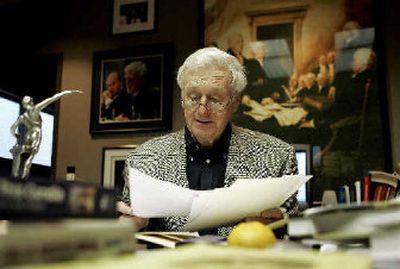Is Wikipedia too much of an open book?

When Jimmy Wales started the online collaborative encyclopedia called Wikipedia four years ago, he had the high-minded goal of creating a sort of digital brain that one day would contain the sum of all human knowledge.
In many ways, Wikipedia, which lets anonymous users add encyclopedia entries and update entries by others, continues to reach for that ambitious goal. It was rated the top reference site by Hitwise, and has versions in 82 languages and more than 850,000 articles in English. In October, 16.3 million people visited the site, says Internet measurement company Nielsen//NetRatings.
But a high-profile recent incident is making some people rethink their faith in the type of anonymous collaborative information gathering that Wikipedia relies on — and is reminding them that just because something looks authoritative, doesn’t mean it necessarily is.
While much of Wikipedia’s information is correct, some is not. And sometimes people lie.
That’s what First Amendment scholar and former USA TODAY editorial page editor John Seigenthaler says he discovered in a biography he found of himself on the site. It was riddled with errors, he says, including a statement that falsely insinuated that he was party to Sen. Robert Kennedy’s assassination. He was Kennedy’s administrative assistant in the early 1960s, and one of his pallbearers.
He did correct the entry, as Wikipedia allows. But he also discovered that once information is put out in cyberspace, it’s not so easy to pull it back. As he noted in a USA TODAY column, the error, which persisted uncorrected for four months, was repeated in other sites.
Seigenthaler called Wikipedia “a flawed and irresponsible research tool” in his column.
Brian Chase, 38, a manager at a small delivery service in Nashville, Tenn., later apologized for posting the errors in a letter he presented to Seigenthaler.
Seigenthaler says Wikipedia’s flaw is that it allows errors to remain online — as “history.”
Seigenthaler fears that Wikipedia will continue to be abused unless it changes its rules to completely erase wrong information.
“Next year members of the Senate and House are going to be running for election,” he says. “Their Wikipedia bios are going to be attacked by online vandals in the same way mine was. I’m not for more regulation. I’m against regulation of the media. I fear (Wikipedia is) inviting it.”
Wikipedia faithful swear by this collaborative system.
“Any place where the general public is allowed to freely express their opinion without having any sort of prior approval from authority — it is dangerous,” says Wales. “Free speech is dangerous. But it’s also incredibly powerful and useful.”
But critics worry that not all Internet citizens are savvy enough to realize that most information online needs to be taken with a grain of salt.
“The problem is that Wikipedia is so often considered authoritative,” Dave Winer wrote in his Scripting News blog after the Curry controversy. “That must stop now, surely. Every fact in there must be considered partisan, written by someone with a conflict of interest.”